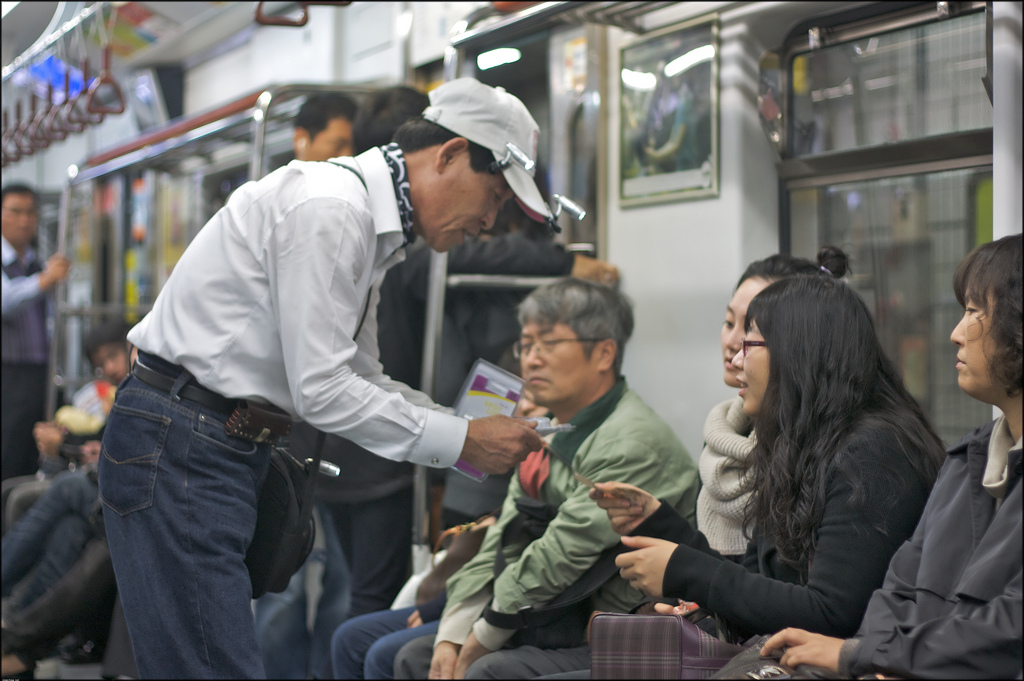
Photo © Stan Chow, licensed Creative Commons Attribution.
Korean etiquette is a thorny issue for many foreign residents, mainly because initially there seems to be a distinct lack of it. Behavior that would be seen as rude or inconsiderate in most Western countries—someone barging their way into an elevator before anyone’s had a chance to get off, talking loudly on their mobile phone in an enclosed space, or jumping ahead of other people in a queue—is not uncommon here, and has been known to ruin many an expatriate’s day. While these kinds of experiences can never be welcomed, it can help to understand some of the thinking (or lack thereof) that lies behind them. In a sense, the basic Korean rules of conduct could almost be viewed as opposite to the Western ones. North Americans and Europeans are generally reserved and self-conscious around strangers but loosen up a bit in the presence of family or friends.In a sense, the basic Korean rules of conduct could almost be viewed as opposite to the Western ones. North Americans and Europeans are generally reserved and self-conscious around strangers but loosen up a bit in the presence of family or friends. For Koreans, relationships are everything—and if you don’t have a relationship of some kind with someone, whether through family, work, school, or marriage, they’re not worthy of much consideration. Koreans therefore tend to give little thought to how they treat or are perceived by strangers, but they are incredibly conscientious, even formal, around their friends and relatives.There are also cultural factors at play. Confucian tradition gives the aged status above just about everyone else, and you’ll notice a lot of the more “assertive” behavior comes from older people, especially older men, who may see taking that seat on the subway or getting served before anyone else as their natural right. Memories of postwar scarcity, as well as a highly competitive society, have created what the locals call a ppali ppali (literally, “hurry, hurry,” or “me first”) culture in which people sometimes feel they have no choice but to act selfishly to get what they need.
But of course the South Koreans do adhere to rules of etiquette, and a basic knowledge of these will be of considerable help to any non-Korean looking to establish friendships or do business here. The barrage of personal questions (Where do you work? How old are you? Are you married?) that often accompanies an introduction is not meant to be intrusive; it’s simply a means to establish where you rank on the social scale and how you should be treated. Bowing does not carry the same weight it does in, say, Japan, but a polite nod of the head in greeting or saying good-bye, particularly to people who are older or outrank you at work, is always appreciated. Gifts and business cards should always be given and received with both hands, and studied carefully before being put gently aside—never in a pocket or bag. Asking someone if they’ve eaten is a polite greeting or expression of concern; by no means is it an invitation to lunch. Compliments are frequently extended and just as often politely rejected by the intended recipient. Invitations or requests, particularly from superiors, are rarely refused outright. There are a host of subtle nuances and unwritten regulations that govern the full spectrum of Korean interaction, but as a foreigner you’re partially exempt, and there’s no need to worry about mastering all of them. Be humble, smile a lot, don’t do anything you wouldn’t do at home, and you should be just fine.
Excerpted from the Second Edition of Moon Living Abroad in South Korea.